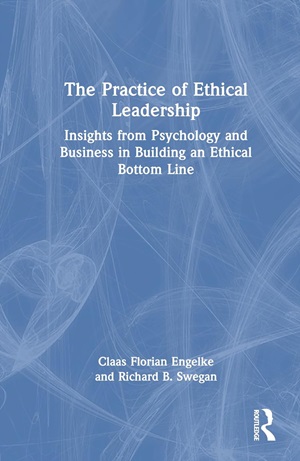Claas Florian Engelke and Richard B. Swegan have achieved something truly remarkable. They have embraced the utilitarian principles observable in the Lean system, married them with distinctive, informed observations, and have come out with one of the most succinct, well-articulated, and objectively informed books on postmodern corporate leadership in some time. While their book, The Practice of Ethical Leadership: Insight from Psychology and Business in Building an Ethical Bottom Line, may not be flowery and lithe in terms of heavy-handed communicatory style, this is more than made up for by their overall ability to make things straightforward, and extensive.
Engelke and Swegan are wise enough to know they are preaching to the choir, but the choir has desperately needed a good song for some time now. Something that can be embraced by those on the fringes, still recovering from old-school, somewhat autocratic skepticism, and those eager to embrace a new kind of leadership philosophy without throwing the baby out with the bathwater. “There are many ways to look at or read a book. It can be information, a story, or multiple other options. We see this book as a dialogue. We lay out a framework for ethical leadership that is a reflection of our research, personal experience, and our opinions. We welcome and invite discussion, disagreement, and hearing your opinion.
You can find our contact information and links to our website later in the book,” writes Engelke and Swegan. They also state, “We think true ethical leadership transcends compliance and ethics policies. True ethical leadership takes moral decision making and action beyond rule obedience. Put another way, probably you will have heard of the phrase, ‘I would follow him or her into battle.’ We suspect that that phrase is seldom used because a leader was great at getting people to follow the rules. More often, it is applied to those leaders who elevated the standard and expectations.
Likewise, we have our own personal views on right and wrong that will probably be transparent to the reader. Certainly, we believe in some transcendent truths, not harming others, revering life, questioning and developing self, but we have attempted to refrain from being overly ‘preachy’ or pedantic. Rather, we have focused more on what we would call ‘process ethics.’ We don’t actually use that term much in the book, but it serves as an undercurrent of our perspective. We think each ethical leader needs to be reflective about matters of right and wrong, engage in discussion with others, and challenge basic assumptions.”
BUY THE BOOK: https://www.amazon.com/Practice-Ethical-Leadership-Insights-Psychology/dp/1032397241
The cynic would say, at a minimum, encompassing such standards is key because of the change in workplace dynamics. Movements like MeToo, Equal Pay, and Gender and Workplace Discrimination initiatives have essentially put to bed the idea of the ‘old dinosaur learning new ways.’ But as Engelke and Swegan demonstrate, another way of viewing it is simply being consistent. Consistency today in one’s personal conduct is pragmatic in a professional context. The days of leadership under a twentieth to twenty-first century William Bligh are over. Now, it’s time to embrace a humanistic perspective that encompasses all aspects of the workplace experience.
Cyrus Rhodes



























